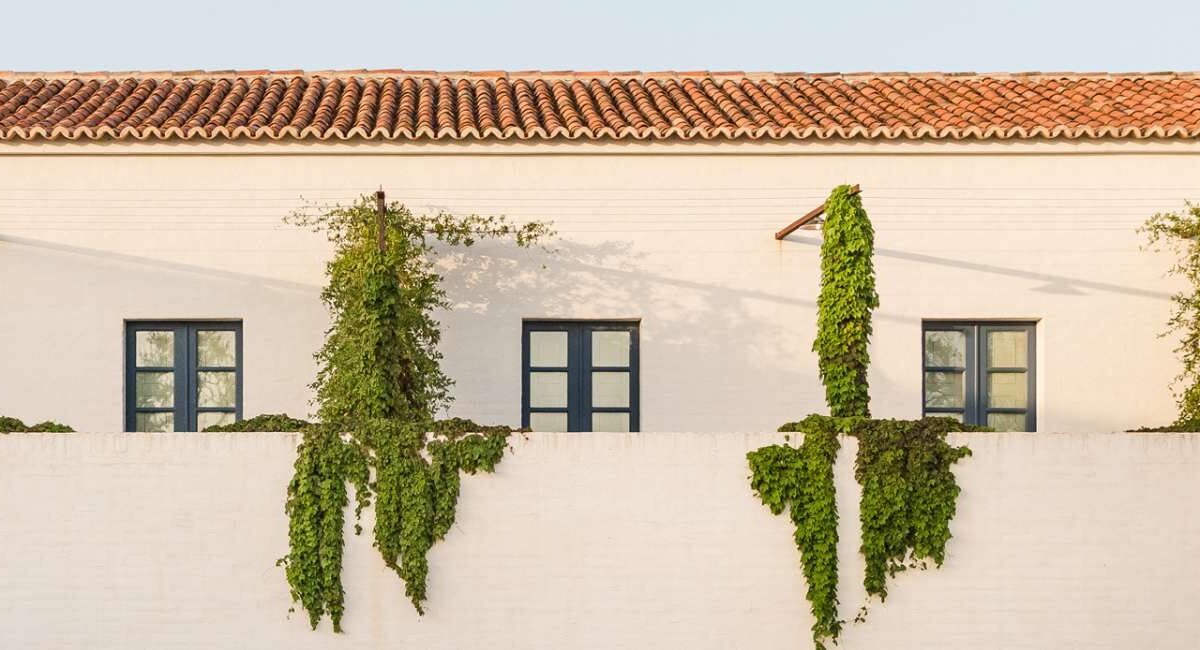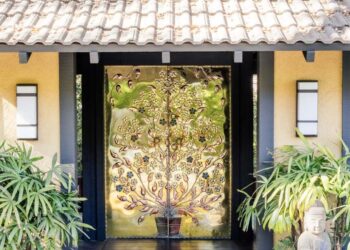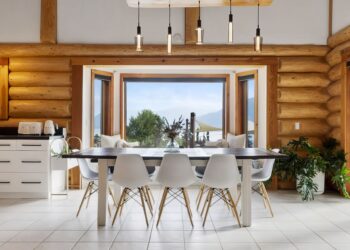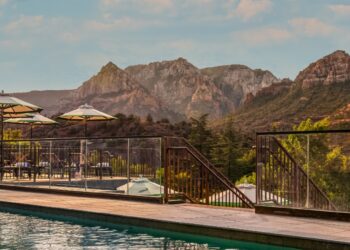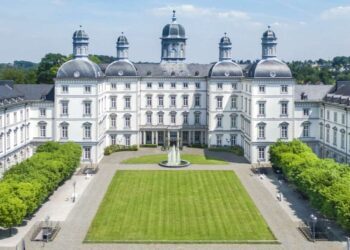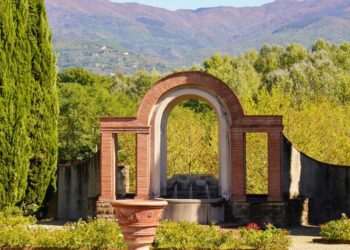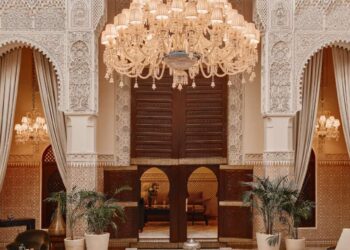Like a much-needed balm, the narrow country lane that leads to São Lourenço do Barrocal in Portugal’s lesser-traveled Alentejo, imparts an immediate calming effect. On either side of the road, fields unfold behind crumbling walls and stalwart trees. Ancient rock formations pierce brushy meadows beyond, the vastness enlivened by lashings of colorful flowers. A peppering of cows and a robust horse or two, like ancient watchmen, stare curiously as I pass. Ahead, through the sun’s mishmash of Impressionistic golden sunlight, the five-star farm retreat, a Leading Hotel of the World, comes into view like a vision of another realm. There’s a scent in the air when I step from the car: pine trees, mulch, and peppery olives, perhaps. On the unhurried drive from Lisbon, located two hours north, I’d felt a heady, childlike anticipation at the thought of experiencing this bucolic hideaway. That feeling reaches a crescendo when the affable staff greet me with warm towels, a glass of estate wine, and an invitation to meet the resident donkeys. Suddenly at home in this pastoral terrain, I revel in the gifts of the hinterlands.
Preserving the Estate’s Heritage
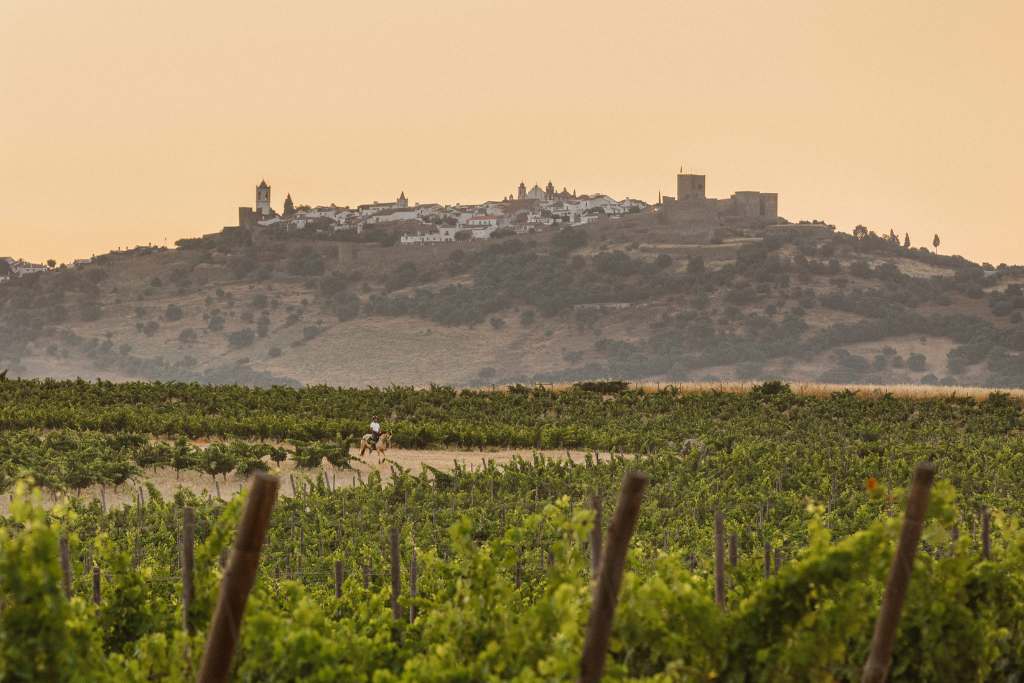
Barrocal occupies an expansive 2,000 acres of olive grove-studded and vineyard-riddled landscape. Its heartbeat, a two-centuries old monte (as farms are known in the Alentejo), unfurls along cobbled alleys edged by gardens and green spaces. The unaffected buildings have white-washed walls and red-tile roofs. Vines and flowers curl over window rims and doors. Gates lead to organic gardens and undeveloped nature, home to various Neolithic dolmens, 75 species of birds, and countless flora and wildlife. At first glance this is a farm — just a beautiful farm. But, it’s so much more.
In truth, I’d expected something with contemporary flourishes, a place where old and new stood juxtaposed. But, what I find exceeds the limits of my imagination. Pritzker award-winning architect Eduardo Souto de Moura, tasked by José António Uva (whose family has helmed and occupied the estate for eight generations), had a vision to preserve the farm’s heritage, to let the past lead. Uva wanted to use its historic imperfections as its assets, to pay homage to its original gifts and to cherish its soul. Redone in 2016 to resemble its authentic self, Barrocal needed only to be reawakened.
Sustainability As Ethos
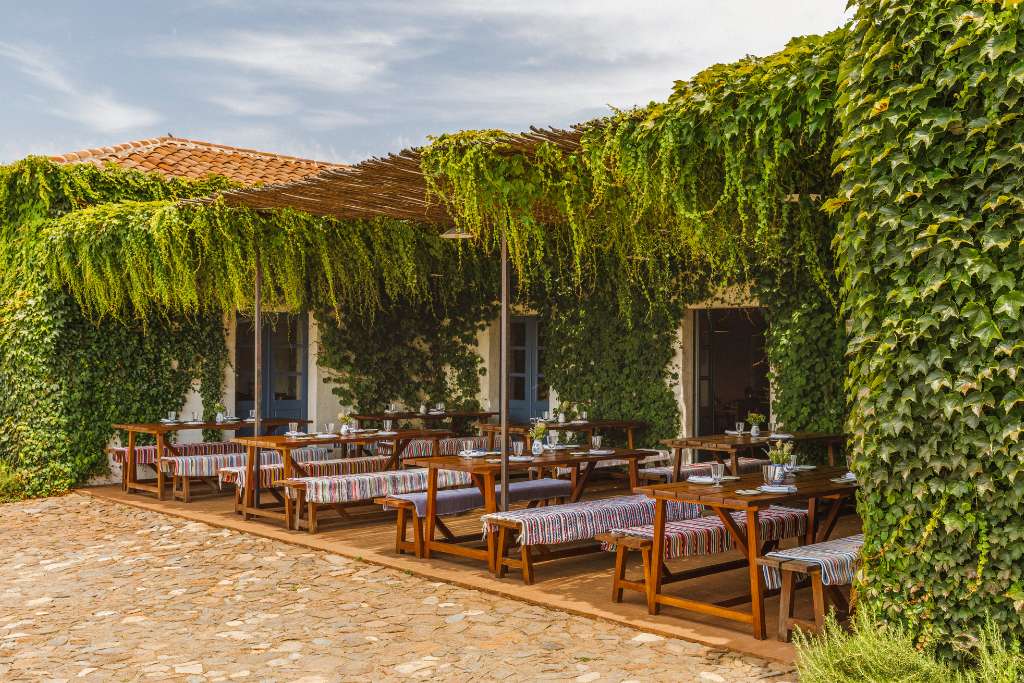
Because it’s early, my room’s not ready – but it doesn’t matter. A picnic has been spread upon a long, hand-carved table, poised on a meandering lawn. Chunks of bread, bright tomatoes, local cheeses, house-made charcuterie, and salads from the farm’s garden compete for attention. Owner José António Uva himself joins the fete, passing plates in every direction as if every lunchtime guest were an old friend. “Food is meant to be shared. That’s how we do it in the Alentejo,” he says, pouring the farm’s own olive oil in a widening circle on a small plate. I swear I see the reflection of the sky in it.
Where You’ll Sleep
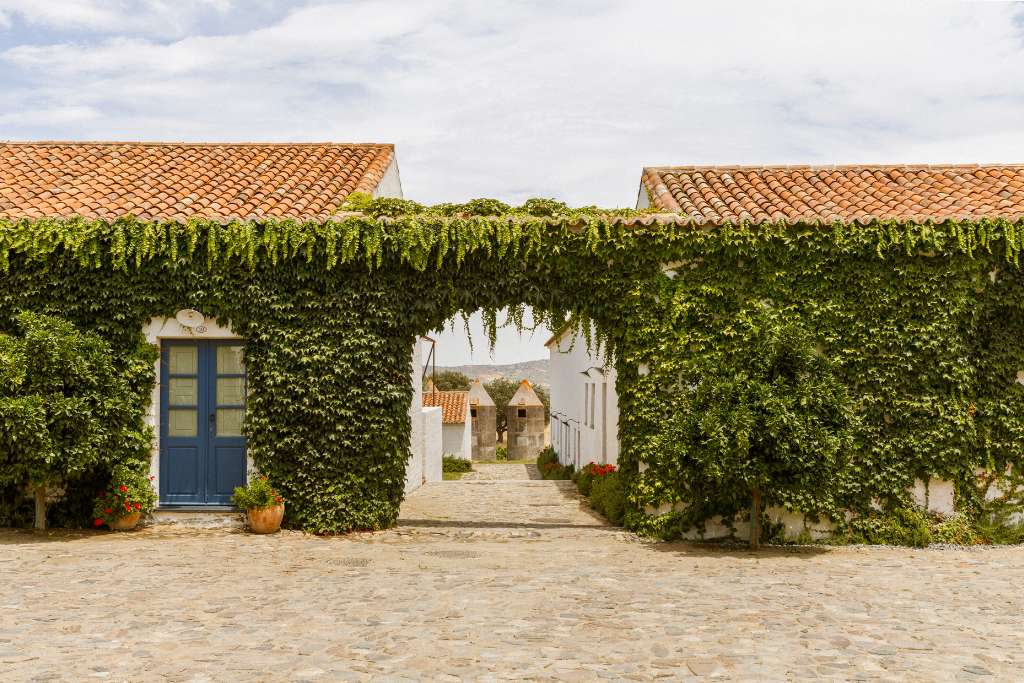
Guest rooms are sewn into the monte’s variety of buildings. You’ll find them over-sized, elegantly stark and soothing, with sumptuous bedding and soaking tubs. They run the gamut to include more basic (but large and alluring) rooms, cottages with multiple bedrooms, and romantic suites. Most rooms have terraces and backdoors that open to nature, places to sit in the morning with coffee listening to birdsong or reading late into the afternoon. With front doors partly hidden by cascading flowering plants (in season), every entrance teases something sublime behind the door.
What You’ll Do
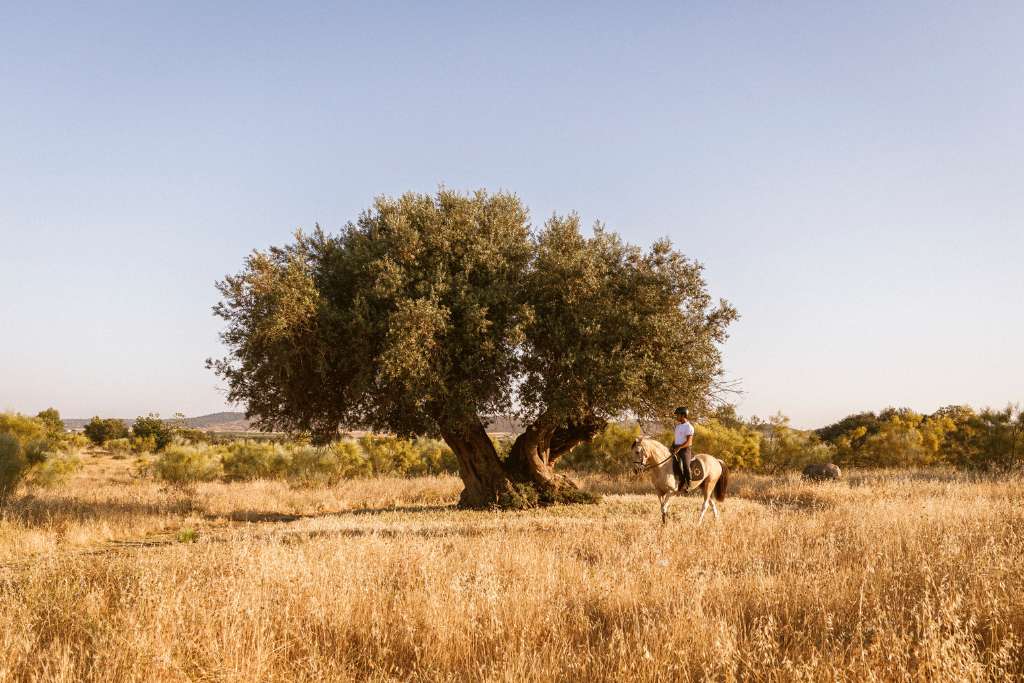
At Barrocal, guests will feel compelled to explore. A host of immersive activities unravel the mysteries of the landscape from wine or olive oil tastings to beekeeping to stargazing. Build a pot at a ceramics workshop in a nearby village famous for its pottery culture; or stroll the property on an ethnobotanical hike with a renowned biologist and birder, who shares generational knowledge of the landscape, bringing it to life. Guests can ride a horse, hover over the terrain in a hot air balloon, blend their own wine, enjoy spa treatments at the Suzanne Kaufmann spa. or splash in the 65-foot pool.
Where You’ll Eat
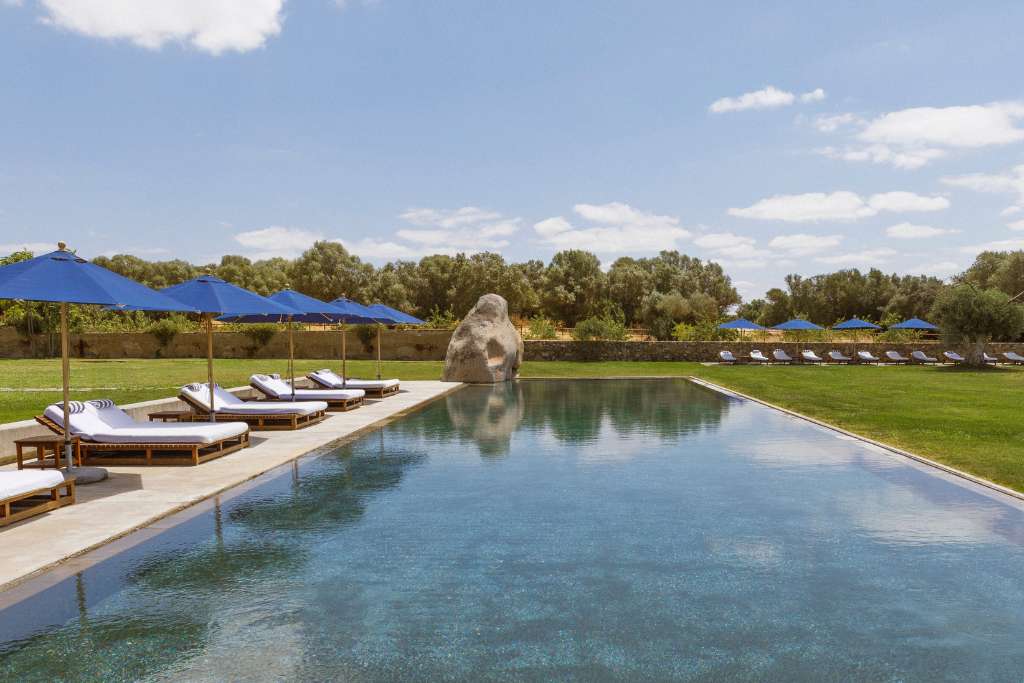
Gastronomy is an event here. Don’t miss a meal. Barrocal has orchards, olive groves, vineyards, organic gardens, and livestock. This monte brings meaning to cliche words like seasonal because so much is grown and produced with bounty from the farm – and if not from the farm, nearby. Choose Hortelão, an al fresco grill restaurant, positioned by the pool, awash in Alentejo charm and sumptuousness. Think acorn-fed pork, charred octopus, and fish from the property’s lake. At the eponymous main restaurant, a feast-like breakfast bedazzles with honey from the beekeeper, cheeses, egg dishes, salads, jams, house made sausages, and more. Dinner might be the estate’s own certified organic veal, delectable black pork, partridge escabeche, tomato soup topped with a house-laid, poached egg, zucchini blossoms, or salt cod fritters. And of course, wine – simply marvelous, full-bodied wine. It’s been made to match the dignity of the landscape, using the ancient Roman Talha method, where grapes ferment in clay amphoras.
Transformative, São Lourenço do Barrocal knows what the world is craving: and it slows us down in the earthiest way possible.

